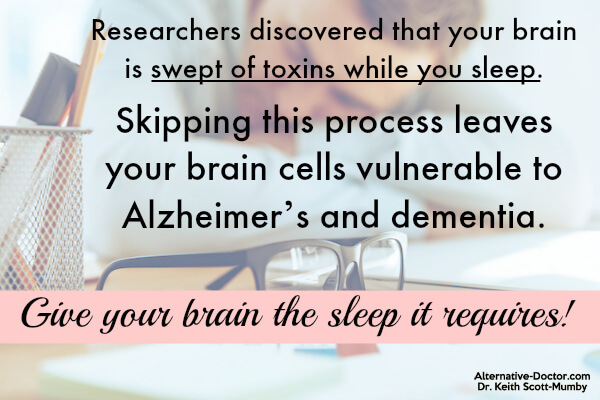The importance of sleep is something that can make me a little preachy. There are many reasons it tops my list of free things you can do right now to improve your mental and physical health.
Getting enough sleep is critical to every cell in your body and one of the biggest connections is between sleep and your brain.
If you don’t get enough sleep…
- You have a higher likelihood of gaining weight.
- You’ll have more inflammation in your tissues.
- Your sex life will suffer.
- You’ll have more mood fluctuations during the day.
- Your workouts won’t be as effective.
- Your driving is worse – comparative to drinking and driving.
- You’ll be more prone to acne and other skin irritations.
- Your risk for substance abuse is higher.
- Your reflexes are slower.
- You won’t be able to concentrate or retain information as well.
- You’ll get sick more and raise your risk for major disease.
- Your ability to manage chronic pain is compromised.
Sleep and Your Brain
As if all of that isn’t enough, researchers discovered that your brain is swept of toxins while you sleep. Skipping this process leaves your brain cells vulnerable to Alzheimer’s and other forms of dementia.
During your sleep cycle, your system naturally increases the flow of a substance called cerebrospinal fluid (CSF). This is the clear fluid that cushions your brain, fills up the spaces between brain matter, and circulates nutrients.
Scientists now know this natural shock absorber is also responsible for bathing your brain matter and spinal cord, washing toxins from your brain during sleep.

When you’re awake, waste products and toxins build up throughout your day. When you sleep, your brain gets a strong rinse that flushes these contaminants away from critical tissues.
Professor of neurosurgery, Dr. Maiken Nedergaard with the University of Rochester explained, “[CSF] is like a dishwasher pumping fluid into the brain and removing fluid from the brain in a very rapid pace. It’s almost like opening and closing a faucet. It’s that dramatic.”
The results of the study were published in the medical journal Science and offer one of the most comprehensive clarifications about the connection between sleep and your brain.
During the course of the research that focused on lab mice, scientists discovered that brain cells shrank during sleep. This allowed the CSF to circulate faster and with more power. Similar to the difference between a water hose and a pressure washer.
Upon waking, the cells returned to normal size and the CSF flow throughout the brain tissue drastically slowed. The study authors believe the process is too complex to operate during waking hours and would impair your brain’s ability to multi-task.
This critical “power wash” must happen during sleep.
If you never give your brain a chance (in essence) to take a shower, the pollutants build up. One of the worst toxins removed during the rinsing process are beta amyloids. These turn into gooey, inflexible plaques over time that can no longer be rinsed away.
Beta amyloids plaques are found in the brains of Alzheimer patients. The medical community is finally recognizing that these connections are not a coincidence.
“Alzheimer’s and all other diseases associated with dementia, they are linked to sleep disorders,” Nedergaard said. The process is fairly simple.
When you’re awake, the beta amyloid content in your brain goes up. CSF washes these substances from your brain during sleep. Therefore…sleep is critical to protecting your brain.
An Important Note to Those Under 50

If there’s one thing I’d strongly suggest to those in the prime of their youth or currently in middle age, it is this: you must protect your brain at all costs.
Alzheimer’s statistics are projected to triple in the next three decades. That means that by the time a 40-year-old today reaches 70 (my age right now) – they’ll be dealing with a worldwide Alzheimer’s epidemic of catastrophic proportions.
Every year, the sleep protection connection is confirmed in yet another study focusing on another area of the brain. You don’t need to read all those results to know that sleep is truly critical to keeping your brain healthy, youthful, and clear of dementia-producing toxins.
It’s time to give your brain the sleep it requires. You can’t start too soon.
The post How Sleep Recharges Your Brain appeared first on Alternative Doctor.

